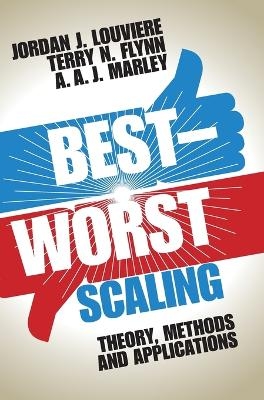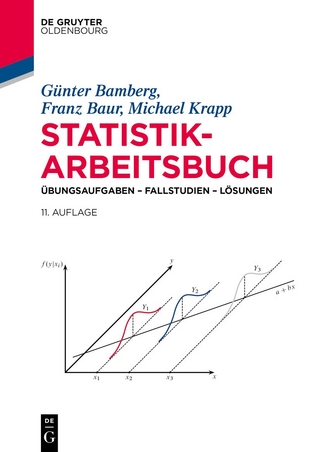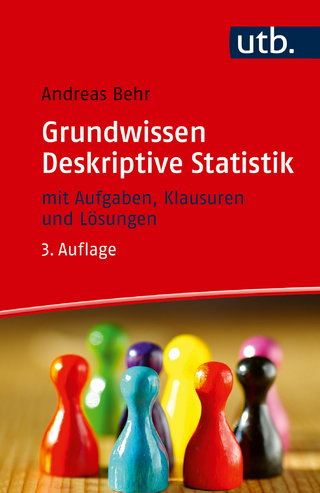
Best-Worst Scaling
Cambridge University Press (Verlag)
978-1-107-04315-2 (ISBN)
Best-worst scaling (BWS) is an extension of the method of paired comparison to multiple choices that asks participants to choose both the most and the least attractive options or features from a set of choices. It is an increasingly popular way for academics and practitioners in social science, business, and other disciplines to study and model choice. This book provides an authoritative and systematic treatment of best-worst scaling, introducing readers to the theory and methods for three broad classes of applications. It uses a variety of case studies to illustrate simple but reliable ways to design, implement, apply, and analyze choice data in specific contexts, and showcases the wide range of potential applications across many different disciplines. Best-worst scaling avoids many rating scale problems and will appeal to those wanting to measure subjective quantities with known measurement properties that can be easily interpreted and applied.
Jordan J. Louviere is Research Professor at the School of Marketing, University of South Australia Business School. He is particularly known for pioneering work in the design and application of discrete choice experiments (also called 'choice-based conjoint') and he also pioneered best-worst scaling (also known as 'Max-Diff Scaling'). He is co-author of Stated Choice Methods: Analysis and Application (Cambridge University Press, 2000). Terry N. Flynn Ph.D. is the Director of TF Choices Ltd, UK and Adjunct Fellow at the University of Western Sydney, Australia. He is globally renowned in the use of discrete choice experiments and best-worst scaling in health and allied fields. He is also a world expert in the scoring of quality of life and end-of-life instruments, particularly using BWS, and is a founding member of the International Academy of Health Preference Research. A. A. J. Marley is Adjunct Professor in the Department of Psychology, University of Victoria, and Research Professor at the Institute for Choice, University of South Australia. He is particularly known for his work in probabilistic models of choice, perception, and voting. He is a co-author of Behavioral Social Choice: Probabilistic Models, Statistical Inference, and Applications (Cambridge University Press, 2006).
Preface; Acknowledgments; Theory and Methods: 1. Introduction and overview of the book; 2. The BWS object case; 3. The BWS profile case; 4. The BWS multi-profile case; 5. Basic models; 6. Looking forward; Applications - Case 1: 7. BWS object case application: attitudes towards end-of-life care Terry N. Flynn, Elisabeth Huynh and Charles Corke; 8. How consumers choose wine: using best-worst scaling across countries Larry Lockshin and Eli Cohen; 9. Best-worst scaling: an alternative to ratings data Geoffrey N. Soutar, Jillian C. Sweeney and Janet R. McColl-Kennedy; Applications - Case 2: 10. When the ayes don't have it: supplementing an accept/reject DCE with a case 2 best-worst scaling task Richard T. Carson and Jordan J. Louviere; 11. BWS profile case application: preferences for treatment in dentistry Emma McIntosh and Terry N. Flynn; 12. BWS profile case application: preferences for quality of life in Australia Terry N. Flynn and Elisabeth Huynh; Applications - Case 3: 13. The stability of aggregate-level preferences in longitudinal discrete choice experiments Towhidul Islam and Jordan J. Louviere; 14. Case 3 best-worst analysis using delivered pizza and toothpaste examples Bart D. Frischknecht and Jordan J. Louviere; 15. Using alternative-specific DCE designs and best and worst choices to model choices Jordan J. Louviere; References; Subject index; Author index.
| Erscheint lt. Verlag | 23.9.2015 |
|---|---|
| Zusatzinfo | 130 Tables, black and white; 49 Line drawings, unspecified |
| Verlagsort | Cambridge |
| Sprache | englisch |
| Maße | 182 x 253 mm |
| Gewicht | 890 g |
| Themenwelt | Mathematik / Informatik ► Mathematik |
| Wirtschaft ► Volkswirtschaftslehre ► Ökonometrie | |
| ISBN-10 | 1-107-04315-8 / 1107043158 |
| ISBN-13 | 978-1-107-04315-2 / 9781107043152 |
| Zustand | Neuware |
| Haben Sie eine Frage zum Produkt? |
aus dem Bereich


